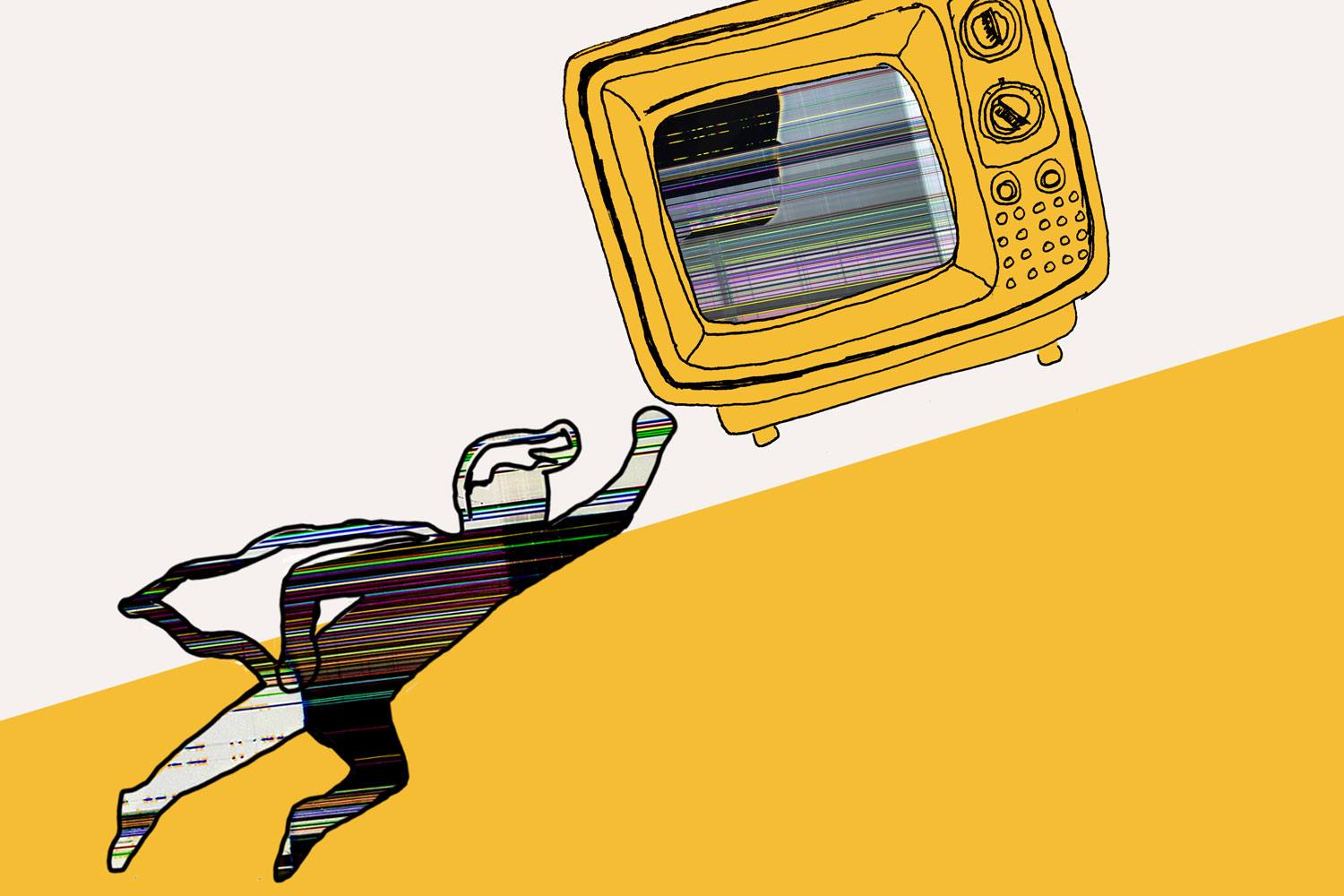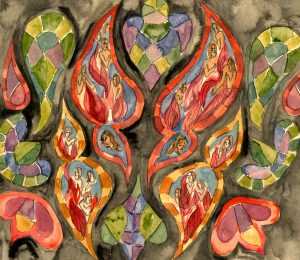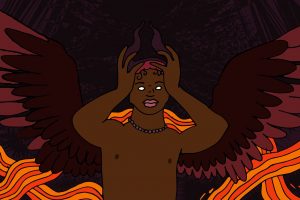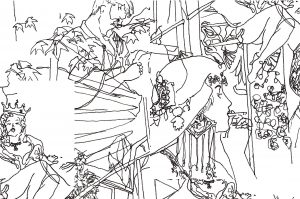
Television Loving Care
by Isla Chaplin | March 17, 2019
“In every generation there is a chosen one. She alone will stand against the vampires, the demons, and the forces of darkness. She is the slayer.”
That’s how every episode of Buffy the Vampire Slayer begins. For the uninitiated: Buffy Summers, a sixteen-year-old California schoolgirl, must fight the monsters that plague her town with the help of her loser friends, a stuffy English librarian, and one-liners sharper than her stakes. Stakes for killing vampires, which then turn conveniently to dust. Obviously.
The show ran from 1997 to 2003. It was campy and ridiculous, but it also created a world in which the ‘hell’ that is high school was made defeatable. Buffy was a breath of fresh air: it acknowledged that teenagers, unlike in the feckless, reckless world of Skins, have real responsibilities that they struggle to cope with. Buffy goes to school, has friends, homework, and a love life, but she’s also patrolling the graveyards of Sunnydale killing vampires every evening. She’s the perfect metaphor for what it’s like to be a teenage carer.
There is no public recognition for saving the world from apocalypse in Buffy. Likewise, staying up all night with your brother who thinks everyone else in the house is possessed doesn’t get you out of your A Levels. Buffy was ground-breaking in so many ways. If you type Buffy the Vampire Slayer into SOLO you will find a slew of papers on its cultural effect. What made it a revelation to me was the way it allowed Buffy to be both strong and weak, self-sacrificingly adult and stubbornly childish, all while bearing a burden that her classmates didn’t understand. I was lucky that I was late to the caring gig. When Buffy is fourteen, a man shows up at the school gates and tells Buffy that she’s about to become the “slayer.” When I was fifteen, my brother got very sick. Both Buffy and I went “Huh?!”
I’d always been vaguely puzzled by the posters at school saying things like: “in every classroom there is a young carer.” Who were these kids? Where were all the sick people? The irony of it is that even though I started cooking meals, babysitting, helping my sister with her homework, and calming my brother down so my parents could go out together for the first time in a year, I never thought of myself as a young carer. Lots of kids cook and help round the house. Who wouldn’t want to keep their brother safe? There are so many people a lot younger than me doing a huge amount more. And lastly, if I was applying to university, which meant leaving my parents and my little sister to do the things I was doing, how could I possibly claim to be a carer?
One of the weird dualities of caring is that you often feel you are both doing too little and too much. Trying to switch between sibling and carer, child and adult, is exhausting. Friends who don’t get it are disheartening. Being the only thing between your brother and a trip to hospital is terrifying, but the weirdest thing is that looking after my brother, or my sister when my parents can’t, is also the most rewarding thing in the world. It’s what I do. It’s what anyone would do. But I do struggle, and I do fail, and I do judge it wrong, over and over again. Part of the reason I couldn’t identify with that poster was that I felt that young carers are often presented as superhuman. I’m certainly not superhuman. Sometimes I don’t even behave like an adult, let alone a carer. This is why Buffy, with her responsibility and lip-gloss and teenage angst, was perfect.
Here was a girl who could laugh about the monsters in the night with her friends, but would also crumble over boyfriend drama and ask for help from an adult in the form of her ‘watcher,’ Giles. He would help without telling her to just ignore the problems and leave it to the adults. Whenever Buffy’s role as slayer was in danger of falling into self-pity, the show would remind its viewers, in its wonderfully cheesy way, that everyone had it tough:
“My life happens to, on occasion, suck beyond the telling of it. Sometimes more than I can handle. And it’s not just mine. Every single person down there is ignoring your pain because they’re too busy with their own.”
The majority of young carers say they are happy to help their family member. This doesn’t do justice to the huge range of experiences and emotions that comes with looking after someone. Because every person is different and every illness is different, every experience of caring is different. There are ten-year-olds who are primary carers for their parents, there are twenty-year-olds who are carers for their children, and there are seventy-year-olds who still live with the siblings they’ve cared for their whole lives. At an access event I asked the coordinator what my college did to target young carers. He looked at me and said: “to tell the truth, not a lot.” Partly because they’re difficult to find, scattered across all demographics, regions and backgrounds, and partly because…I finished his sentence for him: if I were my brother’s primary carer, I would struggle to be here. I simply couldn’t be here, living my own life and getting qualifications to support my family and myself. There are so many people with disabilities, and so many carers who never get that chance. The government doesn’t treat either group with the dignity and respect they deserve, and that’s something to be angry about.
In the world of Buffy, bad things happen because of the strange laws of demon nature, or because people make mistakes. There are “big bads,” but there is no man in a room, or fatal error that cannot be overcome or defeated. Life just keeps on coming. Sometimes it’s vampires, sometimes it’s the evil bureaucracy of the school principal, and sometimes, in real life, it’s what inevitably happens when you under-fund local councils.
The educational provision for children out of school is bad. As the system stands, my brother was out of school for eighteen months. My mum went round a seemingly endless circuit of collecting reports from doctors, hospitals, old schools, new schools and several different ‘co-ordinators’ to format and submit to the local council. The result is an Educational Health Care Plan (EHCP), which gives my brother access to funding so that he can attend a school that is right for him. My mum kept her end of the bargain: the council missed every single deadline they set for themselves. The maximum time between an application being submitted and the decision actually being made is supposed to be twenty weeks. It took them over a year, and this was comparatively lucky. The Suffolk Council took 1,023 days to finalise one young person’s plan. The home-schooling arrangement that helped my brother do his GCSEs simply doesn’t exist across the border in Birmingham. Several councils recently came under fire in The Times for hiring private law firms to defend them against individual families who had appealed their decisions. The government can, and must, do better for disabled people and their families. Instead, they insist on placing the burden on the individual to access their own support, whilst undermining them at every turn. Andrew Barrowclough, director of HCB solicitors, described how he “was recently told of an Local Education Authority that had adopted a criterion where children allegedly had to be over thirteen with a reading age of six to apply [for an EHCP]. That is simply unlawful, but parents don’t know this.”
Where do you go when the system is against you? How do you see the funny side of life? Activists, many of them disabled people and carers, are beginning to take a stand against the government’s failure to provide adequate education and healthcare. My brother loves going to the farm with his new school. My mum has her book club. For me personally, it’s Buffy the Vampire Slayer. Buffy might be able to backflip her way into saving the world, but she also offers generations of young people a way to fight the horrors of everyday life. It’s what she can’t do through superpowers that makes her such a compelling character. It’s the patchy test scores and pressure to save the world and later, in the darker post-high school seasons, watching her struggle to look after her sister and make ends meet by herself. The show laughs at itself, but deep down it takes teenage girls seriously. Buffy shows us that having responsibility doesn’t mean you can’t feel the pressure of it, or struggle with the little things. She also shows us that you can still have fun with your friends, despite it all. In the series finale, Buffy splits her slayer powers with the other girls in the show, sharing the strength she needed to survive teenage girlhood. It was cute, it was cringey, but it was also a nod to what the show did for me right from the very start. ∎
Words by Isla Chaplin. Artwork by Julia Jones.




